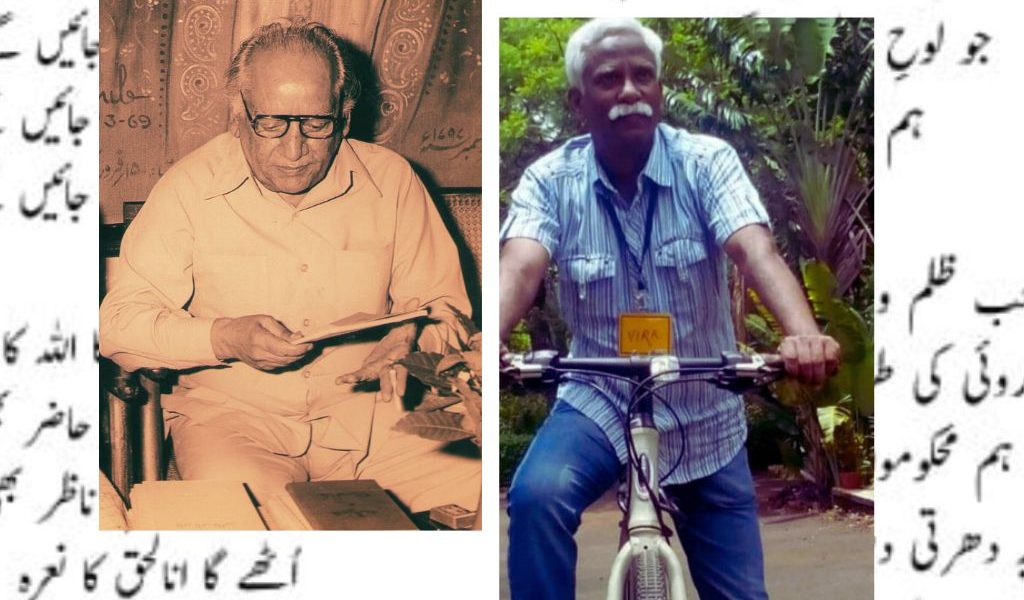Mumbai: Singing the revolutionary poetry of Faiz Ahmed Faiz, once celebrated as a voice of resistance, now attracts sedition charges in India.
At an event organised last week in memory of actor and activist Vira Sathidar, a group of young cultural activists sang the lyrics of Faiz’s famous Hum Dekhenge. The Nagpur police have now booked the organisers and the event’s speaker under Section 152 of the Bharatiya Nyaya Sanhita (BNS), which pertains to sedition, along with other sections of the BNS, including Section 196 (promoting enmity between groups) and Section 353 (statements conducive to public mischief).
Sathidar, an accomplished actor, prolific writer, journalist, and political thinker, died on April 13, 2021, after battling COVID-19 for over a week. Satidhar was also an Ambedkarite and the editor of Vidrohi magazine. Since his passing, his wife, Pushpa, is one of the organisers of the annual memorial. A committee was formed after Sathidar’s death under the name ‘Vira Sathidar Smruti Samanvay Samiti’ which has been instrumental in organising the annual event. This year, social activist Uttam Jagirdar was invited to speak. Although the FIR does not name individuals explicitly, it refers to the event’s organiser and speaker.
At the event organised on May 13 at the Vidarbha Sahitya Sangh, attended by over 150 people, Jagirdar talked about the contentious Maharashtra Special Public Security Bill, 2024. The BJP-led state government is aggressively pushing to convert this bill into a law and implement it. Activists and academics believe this bill, if enacted, will lead to blatant violations of human rights and allow dissenting voices to be labeled “urban Naxals”.
The FIR, filed by one local Nagpur resident Dattatray Shirke, cites a news report aired on ABP Majha, a Marathi channel. The channel was likely the first to find issue in reciting Faiz’s poetry in India. In his complaint, Shirke claims, “At a time when the country valiantly fought Pakistani forces, the radical left in Nagpur were busy singing Pakistani poet Faiz Ahmed Faiz’s poem.
Shirke further claims that the line “Takht hilaane ki zaroorat hai (a need to shake the throne)” constitutes a direct threat to the government. However, while the FIR quotes the above line, the actual line in the poem is “sab takht giraye jayenge”. The poem was performed by young Mumbai-based cultural activists from Samata Kala Manch.
Despite an ongoing stay by the Supreme Court on the application of sedition charges, the Nagpur police have booked the organisers and speakers under the section. On May 11, 2022, the apex court had issued a historic order, staying all pending trials, appeals, and proceedings under section 124-A of the Indian Penal Code until the sedition law’s re-examination was complete. Since then, the BJP-led government has replaced the IPC with the BNS. However, the new law does not eliminate the sedition provision. Instead, the BNS introduces Section 152, which closely resembles the sedition law without explicitly using the word ‘sedition’.
Journalist arrested on same month
This is the second case this month in which the Nagpur police have targeted an individual’s freedom of expression. Earlier this month, a 26-year-old Kerala-based journalist, Rejaz M. Sheeba Sydeek, visiting Nagpur, was arrested for posting a photo of himself posing with two fake guns and opposing the Indian Army.
Initially investigated by the Nagpur city police and now handled by the Anti-Terrorism Squad (ATS), Rejaz is accused of opposing Operation Sindoor – India’s military strikes against terrorist infrastructure in Pakistan and Pakistan-occupied Kashmir. The agency has also alleged that Rejaz has connections with banned organisations, including the Communist Party of India (Maoist), Jammu Kashmir Liberation Front (JKLF), and Hizb-ul-Mujahideen. These banned organisations have radically different ideologies and the police have accused Rejaz of espousing ideologies of each of these banned groups.
Vira Sathidar’s endless protest
During his lifetime, Sathidar faced constant harassment from the police due to his political activism, keeping him under their radar. In a long interview with The Wire, months before his death, Sathidar had raised concern over the government’s tactics of employing new methods to control its citizens. For instance, while shooting for the film Court in 2013, the Gondia police arrived unannounced on the Mumbai set, searching for a “Naxal from Nagpur.” A year before his death, after raising issues against the Rashtriya Swayamsevak Sangh (RSS) headquarters in Nagpur, his house was raided by local police. During the raid, a sword was found, but local youths chased the police away.
In October 2020, when the NIA filed a supplementary chargesheet in the Elgar Parishad case, Sathidar’s name appeared among the so-called “urban Naxals,” a term loosely used by the Devendra Fadnavis-led government to target dissenters. Now, with the Maharashtra Special Public Security Bill, the state government seeks to formalise the term “urban Naxal” within the legal framework.
The government had made several attempts to criminalise Satidhar when he was alive and such efforts have seemingly continued even after his death.
Courtesy: The Wire

